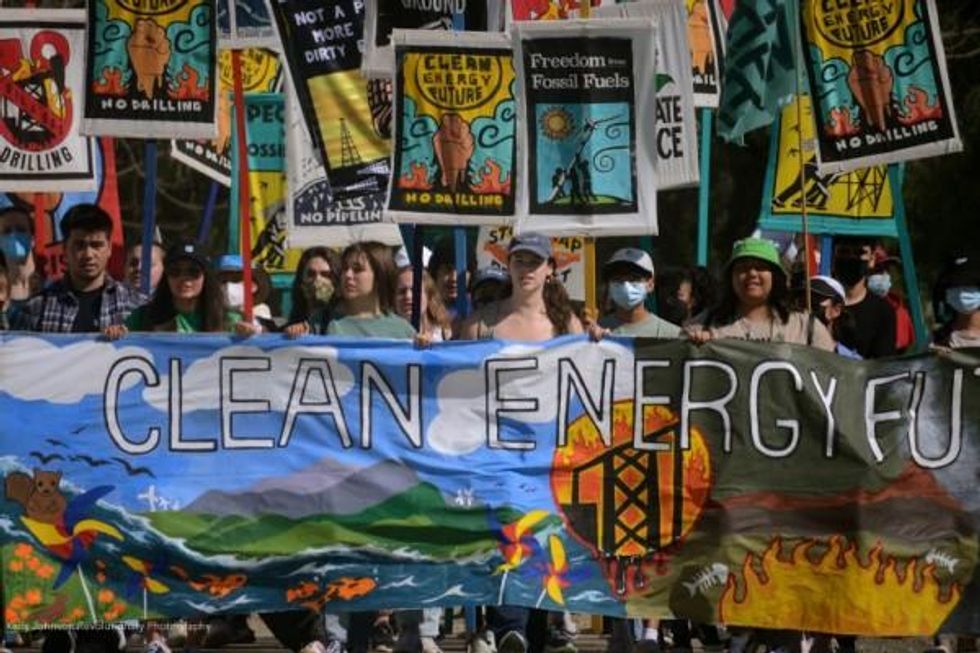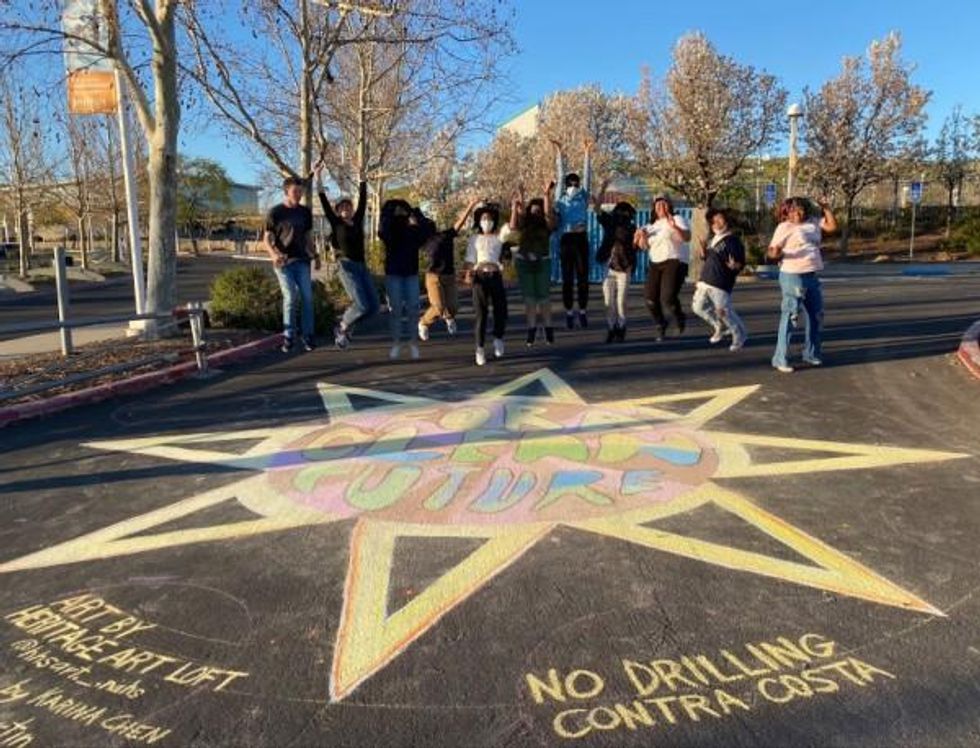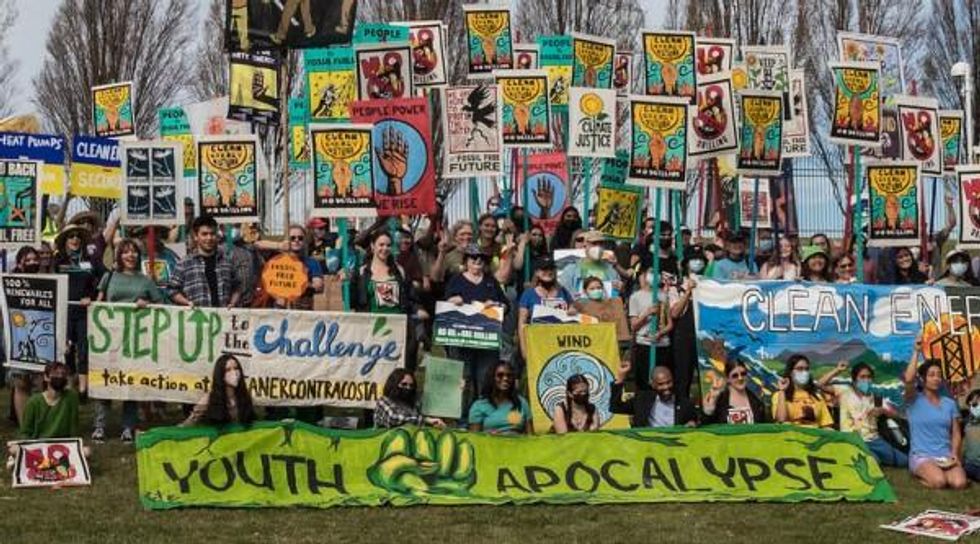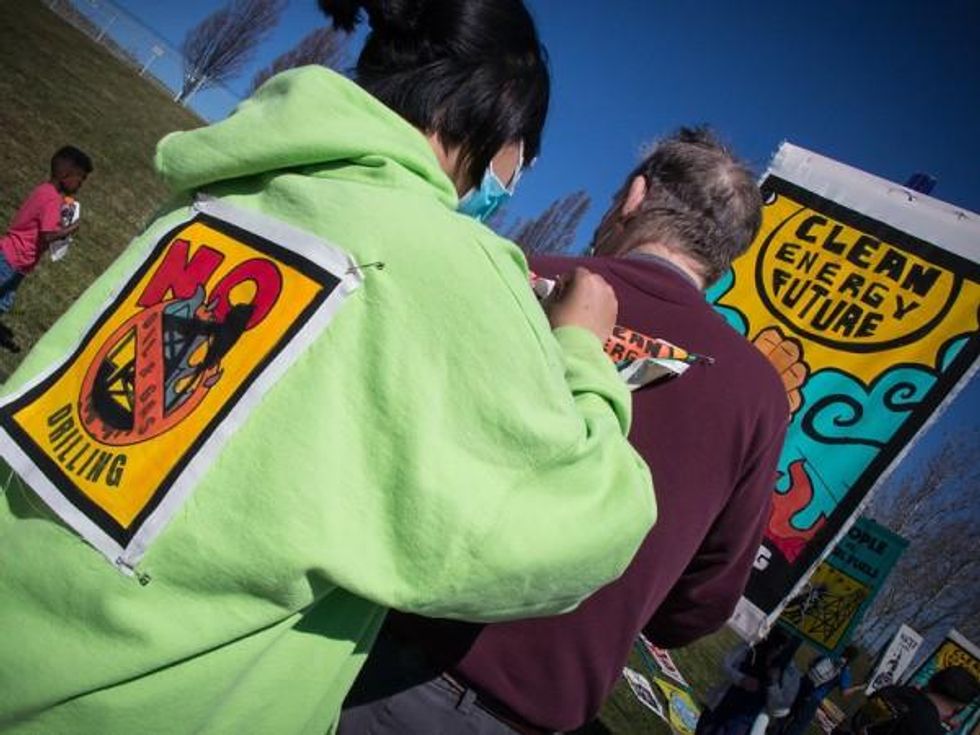

SUBSCRIBE TO OUR FREE NEWSLETTER
Daily news & progressive opinion—funded by the people, not the corporations—delivered straight to your inbox.
5
#000000
#FFFFFF
To donate by check, phone, or other method, see our More Ways to Give page.


Daily news & progressive opinion—funded by the people, not the corporations—delivered straight to your inbox.

Climate Activist Alexi Lindeman. (Photo: Peg Hunter @RawEarthWorks)
Plans to expand fossil fuel production in the San Francisco Bay Area have met resistance, which has just escalated from petitions and a lawsuit to a mass protest organized by high school students. CalGEM, the California Geologic Energy Management agency, has approved a Class II injection well across from the active oil drilling site in unincorporated Antioch, a half mile from Dozier-Libbey High School, the Kaiser Antioch Medical Center, and pending senior housing.
"As people we can demand the changes we want to see with out vote and our buck and industries and governments will have to respond accordingly to us."
The first resistance to hit the streets against these plans for new oil and gas drilling in the Bay Area's Contra Costa County took place on Saturday, March 12th. 300 people marched along busy 6-lane Lone Tree Way amidst green hills covered in bright yellow flowering mustard. The marchers then rallied at the Antioch Community Center across from Antioch High School.
Alexi Lindeman lives in the town of Antioch, which is in the East Bay region of the San Francisco Bay Area, along the Sacramento-San Joaquin River Delta. It's an hour's drive east of Oakland and San Francisco. Alexi is the lead organizer for Sustainable Leaders in Action who led the organizing for this action, working closely with high school clubs and Bay Area climate justice groups. I asked her to talk about the drilling facing her town and the organizing she hopes will stop it.

Fist public march against new Oil and Gas Drilling in Contra Costa County. (Photo. March 12, 2022, @kellyjohnsonrevelationaryphotography)
David Solnit: Why are you concerned about new oil and gas drilling near your town of Antioch in Contra Costa County?
Alexi Lindeman: I'm concerned about new oil and gas drilling because of the health and environmental consequences. A 2021 Stanford study says that those living within 2.5 miles of drill sites face serious health impacts like heart disease, asthma, and preterm births due to air pollution. East Contra Costa, being downwind from four refineries, is already impacted by the fossil fuel industry as our asthma rate is in the 80th percentile. Furthermore, I'm really concerned about the state of our ever-warming climate. At the time I heard about the proposed new drilling in Brentwood, my community was being directly impacted by climate change. The now annual California wildfires were raging and our mandated masks served a double purpose. The choking smoke regularly canceled outside events and sports practices and games. At some point, the "canceling" air quality level was upped from 100 to 150. I specifically remember thinking "why is our health being sacrificed to maintain 'normalcy' in this climate crisis," when walking to cross country practice as the hazy sky dusted the cars. I remember the 13 years of my life when the sky stayed smoke-free year-round. I do not want this extreme fire season to become normal, but deep down I have feeling kids will grow up without ever experiencing a year when the sky isn't orange for weeks on end. So yes, we were pretty upset and concerned to hear about the resurgence of oil and gas drilling when we should be moving away from finite fossil fuels to escape climate change's insidious hand. It was like a slap to the face, and a slap to the fate of our future.

Heritage Art Loft high school art club creates a chalk art mural to greet the march and Rally the next day. (Photo: David Solnit)
DS: What are you and other young people doing about it?
AL: Others and I refuse to sit idly by, watching these drilling sites pollute my community, undermine our health, and further accelerate our world into a climate crisis. We collected nearly 3,200 signatures for a no new oil and gas drilling Contra Costa petition by informing our community about what's happening at school, the farmers market, and on social media. To directly take a stand, we have also public commented at city council meetings and helped ban oil and gas drilling in Antioch by making our voices heard. This past Saturday, we help a No Drilling Contra Costa March and Rally to protest the new drilling occurring in our community and inspire others to take a stand with us.

Group photo during No Drilling Rally at Antioch Community Center. (Photo: Peg Hunter @RawEarthWorks)
DS: Can you describe some favorite parts of the march and rally you co-organized?
AL: I loved seeing how everyone came together to stand up for what they think is right. When I was leading the chants, I looked back and just saw a long, long line of people extending down the whole entire road, waving the beautiful posters and signs. The turnout, art, chants, and drumming beat make it spectacular. That was empowering to see we can make ourselves heard and use our voices and actions to fight for change together. I'm small in the eyes of the Contra Costa Board of supervisors as just one person, but if we can bring together hundreds of people we become impossible to ignore.

Hand screen printed and painted fabric patches were given to participants. (Photo: Peg Hunter @RawEarthWorks)
DS: How do you think we can best change things to address climate chaos and injustice?
AL: One of my favorite quotes is "the climate can change, can we?" To address climate chaos and injustice we will have to many changes both big and small. The good news is we have already started moving in that direction. In the coming years, the world must shift its dependence from fossil fuels to clean and renewable energy sources. Granted these are expensive and honestly not ready for mass-market yet, but in the coming years, improvements to technology will be made, making these energy sources cheaper and more efficient. Systems in agriculture and transportation can be improved to reduce waste and inefficiency. This may include shifting to more plant-based meat replacements or installing better forms/incentives for public transit. Individuals, governments, and businesses are all responsible for this transition. As people we can demand the changes we want to see with out vote and our buck and industries and governments will have to respond accordingly to us.
Dear Common Dreams reader, The U.S. is on a fast track to authoritarianism like nothing I've ever seen. Meanwhile, corporate news outlets are utterly capitulating to Trump, twisting their coverage to avoid drawing his ire while lining up to stuff cash in his pockets. That's why I believe that Common Dreams is doing the best and most consequential reporting that we've ever done. Our small but mighty team is a progressive reporting powerhouse, covering the news every day that the corporate media never will. Our mission has always been simple: To inform. To inspire. And to ignite change for the common good. Now here's the key piece that I want all our readers to understand: None of this would be possible without your financial support. That's not just some fundraising cliche. It's the absolute and literal truth. We don't accept corporate advertising and never will. We don't have a paywall because we don't think people should be blocked from critical news based on their ability to pay. Everything we do is funded by the donations of readers like you. Will you donate now to help power the nonprofit, independent reporting of Common Dreams? Thank you for being a vital member of our community. Together, we can keep independent journalism alive when it’s needed most. - Craig Brown, Co-founder |
Plans to expand fossil fuel production in the San Francisco Bay Area have met resistance, which has just escalated from petitions and a lawsuit to a mass protest organized by high school students. CalGEM, the California Geologic Energy Management agency, has approved a Class II injection well across from the active oil drilling site in unincorporated Antioch, a half mile from Dozier-Libbey High School, the Kaiser Antioch Medical Center, and pending senior housing.
"As people we can demand the changes we want to see with out vote and our buck and industries and governments will have to respond accordingly to us."
The first resistance to hit the streets against these plans for new oil and gas drilling in the Bay Area's Contra Costa County took place on Saturday, March 12th. 300 people marched along busy 6-lane Lone Tree Way amidst green hills covered in bright yellow flowering mustard. The marchers then rallied at the Antioch Community Center across from Antioch High School.
Alexi Lindeman lives in the town of Antioch, which is in the East Bay region of the San Francisco Bay Area, along the Sacramento-San Joaquin River Delta. It's an hour's drive east of Oakland and San Francisco. Alexi is the lead organizer for Sustainable Leaders in Action who led the organizing for this action, working closely with high school clubs and Bay Area climate justice groups. I asked her to talk about the drilling facing her town and the organizing she hopes will stop it.

Fist public march against new Oil and Gas Drilling in Contra Costa County. (Photo. March 12, 2022, @kellyjohnsonrevelationaryphotography)
David Solnit: Why are you concerned about new oil and gas drilling near your town of Antioch in Contra Costa County?
Alexi Lindeman: I'm concerned about new oil and gas drilling because of the health and environmental consequences. A 2021 Stanford study says that those living within 2.5 miles of drill sites face serious health impacts like heart disease, asthma, and preterm births due to air pollution. East Contra Costa, being downwind from four refineries, is already impacted by the fossil fuel industry as our asthma rate is in the 80th percentile. Furthermore, I'm really concerned about the state of our ever-warming climate. At the time I heard about the proposed new drilling in Brentwood, my community was being directly impacted by climate change. The now annual California wildfires were raging and our mandated masks served a double purpose. The choking smoke regularly canceled outside events and sports practices and games. At some point, the "canceling" air quality level was upped from 100 to 150. I specifically remember thinking "why is our health being sacrificed to maintain 'normalcy' in this climate crisis," when walking to cross country practice as the hazy sky dusted the cars. I remember the 13 years of my life when the sky stayed smoke-free year-round. I do not want this extreme fire season to become normal, but deep down I have feeling kids will grow up without ever experiencing a year when the sky isn't orange for weeks on end. So yes, we were pretty upset and concerned to hear about the resurgence of oil and gas drilling when we should be moving away from finite fossil fuels to escape climate change's insidious hand. It was like a slap to the face, and a slap to the fate of our future.

Heritage Art Loft high school art club creates a chalk art mural to greet the march and Rally the next day. (Photo: David Solnit)
DS: What are you and other young people doing about it?
AL: Others and I refuse to sit idly by, watching these drilling sites pollute my community, undermine our health, and further accelerate our world into a climate crisis. We collected nearly 3,200 signatures for a no new oil and gas drilling Contra Costa petition by informing our community about what's happening at school, the farmers market, and on social media. To directly take a stand, we have also public commented at city council meetings and helped ban oil and gas drilling in Antioch by making our voices heard. This past Saturday, we help a No Drilling Contra Costa March and Rally to protest the new drilling occurring in our community and inspire others to take a stand with us.

Group photo during No Drilling Rally at Antioch Community Center. (Photo: Peg Hunter @RawEarthWorks)
DS: Can you describe some favorite parts of the march and rally you co-organized?
AL: I loved seeing how everyone came together to stand up for what they think is right. When I was leading the chants, I looked back and just saw a long, long line of people extending down the whole entire road, waving the beautiful posters and signs. The turnout, art, chants, and drumming beat make it spectacular. That was empowering to see we can make ourselves heard and use our voices and actions to fight for change together. I'm small in the eyes of the Contra Costa Board of supervisors as just one person, but if we can bring together hundreds of people we become impossible to ignore.

Hand screen printed and painted fabric patches were given to participants. (Photo: Peg Hunter @RawEarthWorks)
DS: How do you think we can best change things to address climate chaos and injustice?
AL: One of my favorite quotes is "the climate can change, can we?" To address climate chaos and injustice we will have to many changes both big and small. The good news is we have already started moving in that direction. In the coming years, the world must shift its dependence from fossil fuels to clean and renewable energy sources. Granted these are expensive and honestly not ready for mass-market yet, but in the coming years, improvements to technology will be made, making these energy sources cheaper and more efficient. Systems in agriculture and transportation can be improved to reduce waste and inefficiency. This may include shifting to more plant-based meat replacements or installing better forms/incentives for public transit. Individuals, governments, and businesses are all responsible for this transition. As people we can demand the changes we want to see with out vote and our buck and industries and governments will have to respond accordingly to us.
Plans to expand fossil fuel production in the San Francisco Bay Area have met resistance, which has just escalated from petitions and a lawsuit to a mass protest organized by high school students. CalGEM, the California Geologic Energy Management agency, has approved a Class II injection well across from the active oil drilling site in unincorporated Antioch, a half mile from Dozier-Libbey High School, the Kaiser Antioch Medical Center, and pending senior housing.
"As people we can demand the changes we want to see with out vote and our buck and industries and governments will have to respond accordingly to us."
The first resistance to hit the streets against these plans for new oil and gas drilling in the Bay Area's Contra Costa County took place on Saturday, March 12th. 300 people marched along busy 6-lane Lone Tree Way amidst green hills covered in bright yellow flowering mustard. The marchers then rallied at the Antioch Community Center across from Antioch High School.
Alexi Lindeman lives in the town of Antioch, which is in the East Bay region of the San Francisco Bay Area, along the Sacramento-San Joaquin River Delta. It's an hour's drive east of Oakland and San Francisco. Alexi is the lead organizer for Sustainable Leaders in Action who led the organizing for this action, working closely with high school clubs and Bay Area climate justice groups. I asked her to talk about the drilling facing her town and the organizing she hopes will stop it.

Fist public march against new Oil and Gas Drilling in Contra Costa County. (Photo. March 12, 2022, @kellyjohnsonrevelationaryphotography)
David Solnit: Why are you concerned about new oil and gas drilling near your town of Antioch in Contra Costa County?
Alexi Lindeman: I'm concerned about new oil and gas drilling because of the health and environmental consequences. A 2021 Stanford study says that those living within 2.5 miles of drill sites face serious health impacts like heart disease, asthma, and preterm births due to air pollution. East Contra Costa, being downwind from four refineries, is already impacted by the fossil fuel industry as our asthma rate is in the 80th percentile. Furthermore, I'm really concerned about the state of our ever-warming climate. At the time I heard about the proposed new drilling in Brentwood, my community was being directly impacted by climate change. The now annual California wildfires were raging and our mandated masks served a double purpose. The choking smoke regularly canceled outside events and sports practices and games. At some point, the "canceling" air quality level was upped from 100 to 150. I specifically remember thinking "why is our health being sacrificed to maintain 'normalcy' in this climate crisis," when walking to cross country practice as the hazy sky dusted the cars. I remember the 13 years of my life when the sky stayed smoke-free year-round. I do not want this extreme fire season to become normal, but deep down I have feeling kids will grow up without ever experiencing a year when the sky isn't orange for weeks on end. So yes, we were pretty upset and concerned to hear about the resurgence of oil and gas drilling when we should be moving away from finite fossil fuels to escape climate change's insidious hand. It was like a slap to the face, and a slap to the fate of our future.

Heritage Art Loft high school art club creates a chalk art mural to greet the march and Rally the next day. (Photo: David Solnit)
DS: What are you and other young people doing about it?
AL: Others and I refuse to sit idly by, watching these drilling sites pollute my community, undermine our health, and further accelerate our world into a climate crisis. We collected nearly 3,200 signatures for a no new oil and gas drilling Contra Costa petition by informing our community about what's happening at school, the farmers market, and on social media. To directly take a stand, we have also public commented at city council meetings and helped ban oil and gas drilling in Antioch by making our voices heard. This past Saturday, we help a No Drilling Contra Costa March and Rally to protest the new drilling occurring in our community and inspire others to take a stand with us.

Group photo during No Drilling Rally at Antioch Community Center. (Photo: Peg Hunter @RawEarthWorks)
DS: Can you describe some favorite parts of the march and rally you co-organized?
AL: I loved seeing how everyone came together to stand up for what they think is right. When I was leading the chants, I looked back and just saw a long, long line of people extending down the whole entire road, waving the beautiful posters and signs. The turnout, art, chants, and drumming beat make it spectacular. That was empowering to see we can make ourselves heard and use our voices and actions to fight for change together. I'm small in the eyes of the Contra Costa Board of supervisors as just one person, but if we can bring together hundreds of people we become impossible to ignore.

Hand screen printed and painted fabric patches were given to participants. (Photo: Peg Hunter @RawEarthWorks)
DS: How do you think we can best change things to address climate chaos and injustice?
AL: One of my favorite quotes is "the climate can change, can we?" To address climate chaos and injustice we will have to many changes both big and small. The good news is we have already started moving in that direction. In the coming years, the world must shift its dependence from fossil fuels to clean and renewable energy sources. Granted these are expensive and honestly not ready for mass-market yet, but in the coming years, improvements to technology will be made, making these energy sources cheaper and more efficient. Systems in agriculture and transportation can be improved to reduce waste and inefficiency. This may include shifting to more plant-based meat replacements or installing better forms/incentives for public transit. Individuals, governments, and businesses are all responsible for this transition. As people we can demand the changes we want to see with out vote and our buck and industries and governments will have to respond accordingly to us.